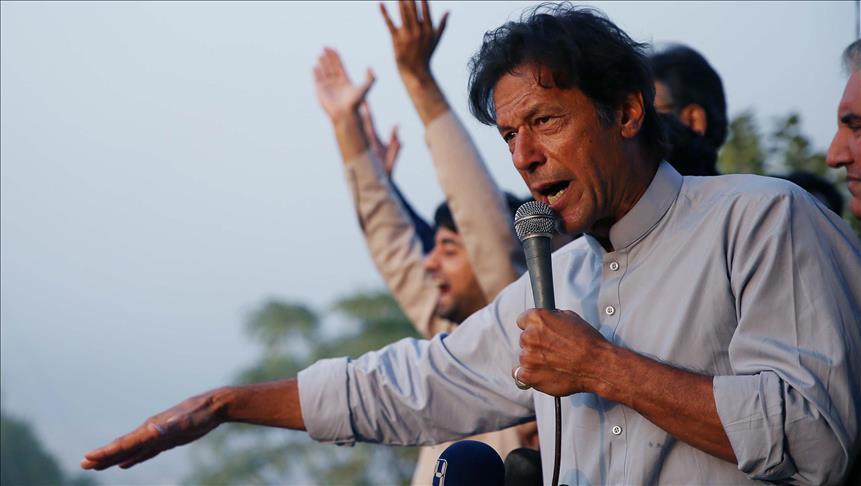Pakistan’s populist leader scrambles to form government
While Imran Khan’s PTI has emerged as single largest party in July 25 polls, it still falls short of 10 seats
 Chairman of Pakistan Tehreek-e-Insaaf (Movement for Justice), Imran Khan
Chairman of Pakistan Tehreek-e-Insaaf (Movement for Justice), Imran Khan
By Aamir Latif
KARACHI, Pakistan
Populist leader Imran Khan, whose Pakistan Tehreek-e-Insaf (PTI) has emerged as the single-largest party in the July 25 elections, is scrambling to garner a simple majority in the parliament to form a new government.
According to the final tally, his party and allies still fall short of 10 seats to form the government with a simple majority.
The PTI has secured 115 out of 272 general seats of the National Assembly followed by Pakistan Muslim League (PML-N) of the jailed ex-Premier, Nawaz Sharif, and center-left Pakistan Peoples Party (PPP), which has grabbed 64 and 43 seats, respectively. The five-party religious alliance Muttehida Majlis Amal (MMA) could win only 11 seats.
Other parties, including the Muttahida Qaumi Movement-Pakistan (MQM-P) won six seats, Pakistan Muslim League-Quaid (PML-Q) five seats, Grand Democratic Alliance (GDA) two seats and Balochistan National Party (BNP) two seats; the Awami Muslim League (AML), Awami National Party (ANP) and Balochistan Awami Party (BAP) won one seat each.
Independent candidates across the country bagged 14 seats.
All the winning parties will also share some 70 seats reserved for women and religious minorities as per their respective seat ratio.
Since the PTI has rejected the possibility of joining hands with the PML-N, PPP, and MMA, it is trying to woo smaller parties and the independent candidates to form the government.
- Number game intensifies
But the number game does not seem to add up for the likely premier, at least for the moment.
For all practical purposes, the PTI’s seat count is 109; while Khan won from five seats and two other senior members of his party grabbed two seats each in last week’s elections, they would be able to cast only one vote each in the election for the prime minister.
Similarly, Khan’s ally PML-Q has grabbed five seats but its leader and a former Deputy Premier Chaudhry Perwaiz Illahi has won on two seats, reducing one more vote for Khan.
The PTI requires 172 seats in the 342-member house -- 272 general and 70 reserved seats -- to form a government with simple majority. It is likely to get 29 out of 70 reserved seats, which brings its total number of seats to 144 (115 general and 29 reserved), which would translate to 138 for vote count for premier.
Even if the PTI manages to muster up support from all 14 independent candidates, PML-Q (4), Grand Democratic Alliance (2), BNP (2), AML(1), and BAP (1), the total figure reaches 162, which is still 10 short of the required simple majority threshold.
The MQM (6) and the ANP (1) have so far refused to join hands with the PTI, but even if they eventually support Khan, he would still require three more seats.
Some analysts think the PTI would have no choice but to talk to a main political party to form a stable government despite its previous stand that it would not do so.
“Even if the PTI manages to form the government with a simple majority, it will remain a weak government amid compromises, trying to make every one [independents and smaller parties] happy,” Salman Ghani, a Lahore-based political commentator, told Anadolu Agency.
“Since coalition with PML-N and MMA is not very much possible due to many reasons, it is better if it [PTI] talks to the PPP to form a strong government,” Ghani added.
- Provincial seats scenario
The PTI has emerged as the only party with representation in all four provinces.
In Punjab, it has locked horns with its close rival PML-N; both parties claim to enjoy majority in the largest province and the country’s political powerbase.
The PTI has 123 out of 297 general seats of the provincial assembly; PML-N is ahead with 127 seats. But the PTI seems to be meeting the required figure of 138 seats for simple majority in the provincial assembly after several independent candidates joined the party in the last couple of days. It also enjoys the support of PML-Q, which has six provincial assembly seats.
The PML-N has the support of six PPP candidates; however, some 28 independent candidates, majority of whom are likely to join the PTI, have turned out to be king makers.
The PTI is enjoying a smooth sailing in KhyberPakhtunkhwa province where it has already crossed the figure required for a simple majority. The PPP is comfortably going to form the government in southern Sindh province with a simple majority, whereas the southwestern Balochistan is going to have a coalition government as usual.
Anadolu Agency website contains only a portion of the news stories offered to subscribers in the AA News Broadcasting System (HAS), and in summarized form. Please contact us for subscription options.







